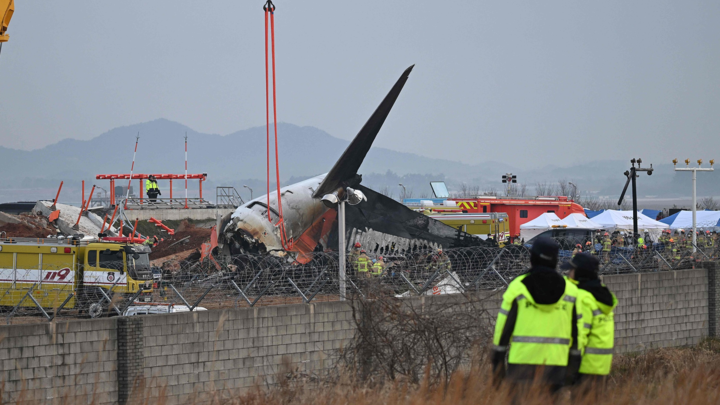South Korea was reeling on Monday from the loss of 179 people after a Jeju Air plane crash-landed and burst into flames, with a team of U.S. investigators joining local authorities to probe possible causes.
The Boeing 737-800 was carrying 181 people from Thailand to South Korea when it crashed on arrival on Sunday, killing everyone on board other than two flight attendants pulled from the twisted wreckage of the worst aviation disaster on South Korean soil.
Officials have cited a bird strike as a likely cause of the crash, which flung passengers from the plane and left it "almost completely destroyed," according to fire officials.
Video showed Jeju Air Flight 2216 landing on its belly at Muan International Airport in Muan, some 288 kilometers southwest of Seoul, skidding off the runway as smoke streamed out from the engines, before crashing into a wall and exploding in flames.
The U.S. National Transportation Safety Board said on Sunday that it would lead a team of investigators, including from Boeing and the Federal Aviation Authority, to join officials in South Korea in probing what caused the crash.
Both black boxes – the flight data recorder and the cockpit voice recorder – have been found.
One of the flight attendants who survived was awake in hospital and able to communicate late on Sunday, the Yonhap news agency reported.
"When I woke up, I had already been rescued," the 33-year-old told doctors, according to the hospital. He suffered multiple fractures, while the other crew member – a 25-year-old woman – injured her ankle and head, Yonhap reported.
Authorities said they were working to complete the identification of all victims.
Minutes before the crash, the control tower had issued a warning of a bird strike, with the pilot soon after making a "mayday" distress call.
Video shows the plane coming off the tarmac and hitting a wall, but officials dismissed speculation that the length of the runway might be a factor in the crash.
Low-cost carrier Jeju Air said it "sincerely" apologized, with top officials shown bowing deeply at a press conference in Seoul.
Boeing said that it was in touch with Jeju Air and stood "ready to support them."
South Korea's acting President Choi Sang-mok, who took office only on Friday, convened an emergency cabinet meeting and then visited the crash site at Muan.
Leaders from multiple countries and international organizations including China, the United States and the United Nations sent condolences to South Korea on Sunday.
South Korea declared a seven-day national mourning period, with memorial altars to be set up nationwide.
It is the first fatal accident in the history of Jeju Air, one of South Korea's largest low-cost carriers, which was established in 2005.
A number of fatal aviation accidents have occurred globally due to bird strikes, which can cause a loss of power if the animals are sucked into a plane's air intake.
(AFP)
